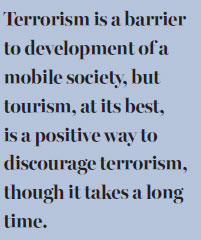Can tourism survive terrorism?

Attacks are meant to weaken society, while a realistic view of risk and a refusal to stop traveling defuse their power
Risk is one of the key factors for tourists when deciding to travel. If the estimated risk is higher than what the tourists are willing to take, they feel insecure and may cancel, postpone or change the trip.
Terrorist attacks, including the Sept 11 attacks in the US, and the Moscow theater siege, have all impacted local and even global tourism and people's way of thinking in the long term.
A terrorist act is a calculated use of violence (or the threat of violence) against civilians in order to attain goals that are political, religious or ideological in nature. They mostly are extreme behaviors that threaten public security like hijacking, hostage-taking, setting off bombs and poisoning. For example, Paris, one of the world's most popular destinations, has experienced a huge drop in tourism since the deadly attacks on Nov 13.
The number of tourists who canceled their trips to Paris in the week after the attacks jumped 21 percent compared with cancellations during the same week the previous year. New bookings dropped by 27 percent, travel data company ForwardKeys says. Bookings for Christmas were down 13 percent compared with the same period last year, according to CNN.
Some people began to worry about whether tourists would still visit France. This worry was also reflected in the stock market. The shares of Accor, Europe's biggest hotel operator, dropped as much as 9.3 percent, the biggest decline since Aug 24. Some countries issued travel warnings to their citizens in the aftermath of the attacks. The US State Department issued a worldwide travel warning.

Tourism is a mature form of consumption with large demand elasticity. Terrorist attacks are snowstorms chilling tourists' enthusiasm. Scaring people and making society feel insecure are basic features of terrorism.
Terrorists' real targets are not the victims, but public opinion. Terrorism is effective because of its symbolism. It is a war of psychology against society. That's why terrorists often choose symbolic places as targets. Experts in terrorism have found that terrorist attacks are dramas, and the real victims are those who watch the drama instead of the actors in the drama. Many scenic spots are symbolic landmarks, so if attacked, they can cause an ever-widening circle of responses in society.
Peter E. Tarlow, a well-known expert specializing in the impact of crime and terrorism on the tourism industry, says he thinks terrorist acts are changing from creating horror to destroying symbols such as the Statue of Liberty or Eiffel Tower. These might be potential targets for terrorists because they are usually the symbol of the country's civilization and hospitality. Attacks on tourism destinations also are more likely to attract attention due to those destinations' huge economic significance. Meanwhile, the clumsy and ineffective mechanisms for protecting tourist destinations comprise another, less obvious cause for them to be targeted.
Terrorism is a barrier to development of a mobile society, but tourism, at its best, is a positive way to discourage terrorism, though it takes a long time. Real global tourists are people who pay attention to global affairs, so they are more tolerant and more likely to understand different cultures or religions. They don't try to force others to believe in their values, let alone take revenge on a society by killing people who are different.
In an age of globalization, terrorist attacks can have a butterfly effect on every single person on Earth via mass media and frequent exchanges. British sociologist Anthony Giddens says people living in these globalized times are no longer struggling against enemies but risks. Risk is an important feature of modern society. Terrorist attacks, ecological and climate change, or nuclear wars are risk factors that affect many individuals in the world. There are risks even if you don't take actions that imply accepting them.
Giddens points out that when people are confronted with risk, the first thing they should do is to admit it and accept it. The second step is to be optimistic. An adventurous spirit makes for a dynamic society. There's no need to be so cautious as to avoid taking creative actions.
The risks of tourism have existed since ancient times. There have long been wars, robbers and natural disasters, but history moves on. It is wise to estimate risks and look at them in a proper fashion. After all, boundless scenery is found at the perilous peak.
The author is deputy director at the China Society for Future Tourism Studies. The views do not necessarily reflect those of China Daily.
(China Daily European Weekly 01/08/2016 page9)
Today's Top News
- New engine powers cargo drone expansion
- China to boost intl cooperation on green tech
- Factory activity sees marginal improvement in November
- Venezuela slams US' 'colonial threat' on its airspace
- Xi: Strengthen cyberspace governance framework
- Takaichi must stop rubbing salt in wounds, retract Taiwan remarks






























